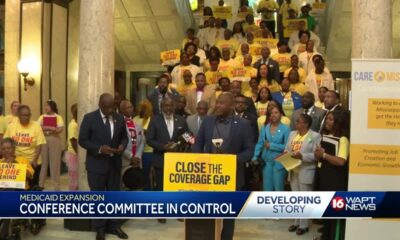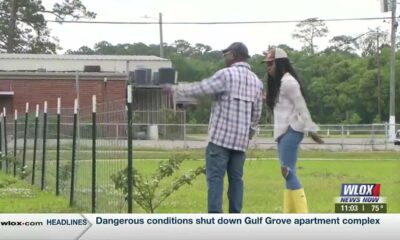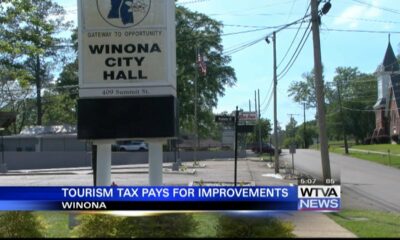Mississippi News
Lawmakers spend unprecedented state, federal funds
Lawmakers near finish line on spending unprecedented state and federal funds
Legislators worked late Monday night to fund state government at an unprecedented level and also to spend the bulk of $1.8 billion in federal pandemic stimulus provided to Mississippi by Congress.
The overall state support budget that has been agreed to by legislative leaders and is being rubberstamped by the full membership is expected to be $7.32 billion, or 9.2% more than what was appropriated for the current fiscal year.
Work continued late Monday to finalize the budget for the new fiscal year than begins July 1 and to spend the federal American Rescue Plan Act money. Legislators have a midnight Tuesday deadline to complete the process.
The bulk of the state's federal ARPA money — $750 million — will go to cities, counties and rural water associations as matching money or grants for water and sewer infrastructure projects.
Note: Scroll to the bottom of this story to see a full list of the ARPA spending.
Because of an April 5 deadline and because legislators are limited in their impact over the budgeting process, most of the about 100 budget bills presented by the leadership were being approved Monday with little or no debate.
“This is frustrating on two levels: not enough members have input and if the conferencing (negotiations) was done in the open, then members would at least have more of an idea,” said Rep. Robert Johnson, D-Natchez, the House minority leader.
“And we are almost forced to take a vote because so much is done at deadline.”
Because of the infusion of an estimated $35 billion in federal coronavirus-relief funds into the state economy, state tax collections have soared, placing legislators in the rare position of being able to address more state needs than they are able to do during most sessions.
The state-support budget is funded from general tax revenue, such as the tax on retail items, income and other items. It does not include what are known as special fund agencies that are funded through a special tax or fee and it does not include federal funds, which provide state government an extra $11 billion.
Referring to the state support budget, Senate Appropriations Chair Briggs Hopson, R-Vicksburg, said, “To keep government services at the level we expect them to be we have to spend a little extra money to keep up with inflationary costs. I think we have done that in a responsible way in this budget.”
Hopson said the budget for most state agencies grew by an average of 3.1%. But the budget, which was still being finalized late Monday also will include other significant spending — sometimes one-time spending. For instance, the Legislature is budgeting $54 million to the Department of Human Services for a new computer system designed to help the agency that oversees various federal social services to operate more efficiently.
Public education formula will be shorted again
One entity that it appears will not keep up with inflation is the appropriation for the Mississippi Adequate Education Program, which provides the state's share of the basics to operate local school districts.
MAEP's funding is expected to increase $83.2 million, or 3.7%. But about $45 million of that additional spending will go for a teacher pay raise approved during the 2021 session, meaning those funds will not be available to help with the more than 6% increase in inflationary costs.
Senate Education Chair Dennis DeBar, R-Leakesville, said MAEP will be about $304 million short of full funding.
The budget also will include $246 million for the teacher pay raise approved this year by the Legislature. Those funds for the latest pay raise will not be incorporated into the MAEP funding formula until next year.
In addition, it appears that both the community colleges and public universities will receive sizable increases that can be used to provide faculty pay raises. The budget for the 15 community colleges is expected to increase almost 11% or $27.4 million, while the budget for the eight public universities is slated to jump by $125.7 million or 17%.
The budget also includes funds to pay for the increased costs to employees in the state health insurance program.
Hopson said the budget will also ensure no state employee “is going to be paid below the minimum as set by the state Personnel Board.”
The minimum is established by the Personnel Board by determining the salary for similar positions in the private sector and in surrounding states. Employees can go to the state Personnel Board web site to see what the salary range is for their job.
How federal ARPA money will be spent
Lawmakers agreed on spending $1.5 billion of the $1.8 billion the Legislature received, holding back more than $295 million that can be spent next year.
The largest expense — $750 million — will be providing matching money for city and county governments and rural water associations to help the states aging water and sewerage infrastructure. Cities and counties are receiving a combined separate $900 million in ARPA funds. The state will provide a 1-to-1 match to most cities and rural water associations, and a 2-to-1 match for small towns that are receiving less than $1 million from ARPA. The cap on the state ARPA match for cities will be $50 million.
The money would be provided as grants of up to $2.5 million for rural water associations.
Lt. Gov. Delbert Hosemann had initially pushed to spend much more on matching funds for major water, sewer and other projects for cities and counties. Hosemann had originally proposed the state spend up to half of its $1.8 billion ARPA allotment to match state funds to allow for larger, “transformational and generational” projects for local governments.
But legislative leaders and the head of the association representing Mississippi cities said they were pleased with the final ARPA spending agreement.
“We are disappointed it's not as much as initially discussed — the needs are there — but we think it's good they've come to this agreement,” said Mississippi Municipal League Director Shari Veazey. “There was talk at one point about them waiting for a year. Our cities have shovel-ready projects.”
Representatives of rural water associations — which provide water to most Mississippians — had told lawmakers they have about $1.4 billion in badly needed projects statewide. Many of these systems were built in the 1960s and 70s when affordable USDA loans were available, but they have not been able to afford maintenance and upgrades.
Sen. John Polk, R-Hattiesburg, led hearings over the summer and helped craft the Senate's ARPA spending plan — much of which was agreed to by the House.
“I'm very pleased,” Polk said Monday evening about final ARPA agreements. “We are fixing to spend a lot of money that badly needs to be spent on very worthwhile projects across the state of Mississippi.”
House Speaker Pro Tem Jason White, R-West, said he was also pleased with the ARPA spending agreements. He said lawmakers can monitor the water and sewerage match programs, and potentially shift money or add more to it next year.
Although there was very little debate on any ARPA or budget bills as both the House and Senate passed bill after bill in a marathon Monday, some ARPA spending did generate questions. The decision for the state to provide $20 million in ARPA funds to private colleges and K-12 schools drew questions, and although it passed, it had some bipartisan opposition. The measure passed 64-27, with 16 not voting and 13 voting present.
“When you're saying ‘independent colleges,' that would be private colleges?” asked Rep. Becky Currie, who voted against the measure.
Rep. William “Bo” Brown, D-Jackson, said: “It seems to me we should be putting this money into our public schools, not private ones.”
In summer hearings, private college representatives said many of their campus buildings are around 100 years old and need work, and like public universities they could expand their nursing and other healthcare programs to help the state's shortage.
ARPA spending list
Here is how lawmakers agreed to spend $1.5 billion of the more than $1.8 billion in ARPA funds allocated to the Legislature:
Environmental Quality/local water and sewerage: $450 million to match city and county ARPA money for water and sewerage infrastructure projects.
Child Protection Services: $59.1 million, the bulk of which will help the state's troubled foster care system meet federal court-ordered reforms from a long-running federal lawsuit.
Employment Security: $60 million. This includes $40 million for nurse training at colleges and universities $20 million for health sciences infrastructure.
Emergency Management: $3.2 million to defray COVID-19 expenses.
Department of Finance and Administration: $337.25 million. This includes infrastructure upgrades at state agencies, colleges and universities and state parks. It also includes:
- $30 million: to tourism destination marketing organizations statewide
- $5 million: Small museums loan program
- $5 million: Mainstreet Program
- $10 million: to private colleges and universities
- $10 million: grants private K-12 schools
- $60 million: to defray increases in state employee health insurance costs
Health Department/rural water associations: $339.5 million, including $300 million for fiscal 2022 and $39.5 million for FY'23. The bulk of this, $300 million, will go to rural water associations statewide for infrastructure upgrades. Other money will go to Health Department operations, reimbursing hospitals for ICU and specialized beds during the pandemic and telehealth and other programs.
Public Universities/UMMC: $56 million. This includes $6 million for a nurse loan repayment and $50 million for University of Mississippi Medical Center renovations.
Mental Health: $104.6 million. The bulk of this money will be used to meet federal court-ordered reforms. Community mental health centers will receive $18.5 million.
Public Safety: $32.5 million over FY'22 and FY'23. This includes $12 million for premium pay for law enforcement and firefighters and $5 million for death benefits for first responders who died from COVID-19.
Supreme Court: $3.5 million. This includes money for DAs and staff, public defenders and trial judges to help reduce court backlogs.
University of Mississippi Medical Center School of Nursing building: $55 million.
Mississippi National Guard: $10.4 million for base infrastructure and improvements.
This article first appeared on Mississippi Today and is republished here under a Creative Commons license.
Mississippi News
Hatley seniors announce post high school plans during Decision Day
SUMMARY: Seniors at Hatley High School have been preparing for life after graduation with the help of a career coach for at least two years. Students like Madison Case participated in internship programs that allowed them to gain real-world experience and make a difference in their community. The career coach, Amie Prewett, works with juniors to help them define their goals and interests, providing job shadowing opportunities, college visits, and internships. The partnership between the school and local organizations like Monroe Strong has been instrumental in guiding students towards their desired career paths. The success of the program was evident in the positive feedback from students and parents.
The post Hatley seniors announce post high school plans during Decision Day appeared first on www.wcbi.com
Mississippi News
Gordo Bypass in the works to improve Highway 82 traffic
SUMMARY: The 6.2-mile Gordo Bypass project in Alabama has two phases: the grade and drain phase completed in 2023, and the base and pave phase expected to start this year. The project aims to improve safety, mobility, and commerce for motorists in West Alabama. Once finished, US-82 will have four lanes from the Mississippi state line to Tuscaloosa. The project is expected to cost around 63 million dollars and will increase the capacity of Highway 82 while decreasing heavy truck traffic through Gordo. Local residents see opportunities for growth and development with the completion of the bypass.
The post Gordo Bypass in the works to improve Highway 82 traffic appeared first on www.wcbi.com
Mississippi News
Entertainment District looks to draw people in
SUMMARY: Customers in Starkville can now get a branded cup for their open container of alcohol in the Entertainment District. Restaurants and hotels in this area received branded “Go Cups” as part of an ordinance passed in 2020 that allows patrons to leave licensed premises with alcohol. The cups feature Starkville's logo and a QR code linking to information about the district. These cups aim to draw more people into the Entertainment District and showcase what it has to offer. Businesses in the area already provide drinks to-go, and the branded cups help promote the district to tourists and locals.
The post Entertainment District looks to draw people in appeared first on www.wcbi.com
-
Mississippi News6 days ago
Mississippi will soon be bombarded with cicadas
-
SuperTalk FM5 days ago
4 tornadoes touched down in Mississippi during latest round of severe storms
-
SuperTalk FM3 days ago
Chance of parole denied for man who killed 3 Choctaw Indian tribal members
-
SuperTalk FM6 days ago
2 Jones County correctional officers arrested in smuggling bust
-
Local News5 days ago
Almost 3,500 Mississippi Veterans have enrolled in VA health care in past 365 days, 28% increase over last year
-
Kaiser Health News3 days ago
To Stop Fentanyl Deaths in Philadelphia, Knocking on Doors and Handing Out Overdose Kits
-
SuperTalk FM5 days ago
Amazon project in Madison County to be over $10B, create more jobs than projected: report
-
SuperTalk FM2 days ago
2 arrested after missing man’s body found on side of Mississippi highway











































